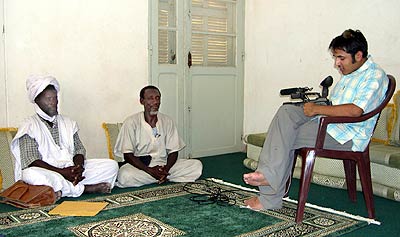UC Berkeley Web Feature
 |
Jigar Mehta (right)
interviews a slave and a member of the underground railroad in a safe house in Nouakchott, Mauritania's capital. |
Student filmmaker Jigar Mehta documents slavery's persistence in West Africa
BERKELEY – This summer, UC Berkeley journalism student Jigar Mehta snuck across West African borders on an unusual assignment: to find and talk to Moorish people who had been enslaved in Mauritania. Traveling on a tourist visa, with video and sound equipment in tow, Mehta and a translator spent five weeks documenting oral histories.
"Slavery - in the form of manual labor, sheep herding, cattle herding, construction, and domestic work - has been going on for over 800 years since the Arabs came down," said Mehta. Mauritania's population is a mixture of indigenous West Africans (also called "Black Moors" and "Afro-Mauritanians") and Arabs from North Africa, or "White Moors." Everyone is Muslim but slavery persists despite the Mauritanian government's legal ban on slavery.
 Mehta took a day off to enjoy Mauritania's pristine beach and the Atlantic ocean. |
The 25-year-old Mehta was one of ten 2004 summer fellows chosen by the Human Rights Center, an organization that sends UC Berkeley students to work with domestic and international non-governmental organizations. Mehta was sponsored by the American Anti-Slavery Group (AASG), which is based in Boston, Mass., and by SOS Slaves in Nouakchott, the capital of Mauritania.
"SOS raises awareness that by law, the 'slaves' are free," Mehta said. Founded by former slaves and a former slave master, SOS works to eradicate slavery and racist caste systems that still exist despite being outlawed by the Mauritanian government. "Mauritania has banned slavery three times, the last time in 1981. But the slaves don't understand the idea or concept of freedom because they were born into slavery. SOS raises awareness of their rights, including helping them file paperwork against their master to fight for their land."
Mehta decided to avoid flying into the international airport in Nouakchott, where he feared he would raise suspicions of immigrant officials. Concealing his journalistic agenda and video equipment, he elected instead to land in Dakar, the capital of the neighboring country of Senegal. After traveling by country-taxi to the border, Mehta crossed the Senegal River by canoe into Mauritania this past July.
"It's much easier to trick the border guards because they don't check your bags there," Mehta said. "Once you get to the other side of the river, there is a police officer who asks for your passport," Mehta said. "You hand him the passport with some money inside, which fast-tracks the application."
Once in Nouakchott, Mehta interviewed ten people, including a woman who had given birth to three children conceived by her master.
"She didn't talk of birth control or rape. Rather, she would say, 'He took me in as his wife for the night, and now I have these three children," Mehta related. "She also had to cook and clean; later she ran away. But her master knows where she is and he can come and take the children away as property at any time."
Many people trying to escape slavery are hampered by the fact that they could not leave an area or pass police checkpoints without an identity card. "And you can't get an identity card if you have a certain name, look a certain way or speak a certain language," he explained. "The overarching government is Arab and policies are set in place to keep down the Blacks."
Mehta returned to Berkeley in August to complete his graduate work in documentary film. Although AASG will use his footage to raise awareness of slavery and money for the organization, he is not pursuing the same subject matter for his master's project. "I think I might pick something lighter," he said. "I see the value in human rights journalism but also see the value in taking a vacation." Mehta went to Mauritania to try international reporting in a culture and environment that he knew nothing about, but the experience, especially the subject matter, was difficult. "I like to think that journalists want to better humankind, but it's a challenge," he admitted. "I wonder how to keep going and living the life that I have, dealing with what I know about other people's lives."
Along with other summer fellows, Mehta will present his research at the Summer Human Rights Fellowship Conference on November 4 at UC Berkeley. For more information, visit the Center's website: www.hrcberkeley.org.

